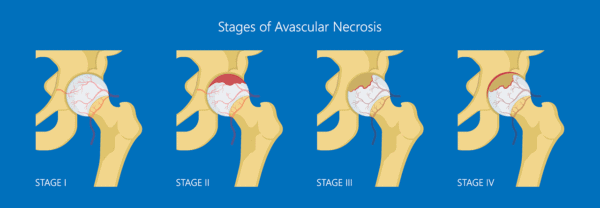Oral Steroids and the Tragedy of Osteonecrosis/Avascular Necrosis

Rumruay/Shutterstock
One of the tragic medical conditions we’ve seen this past 6 years while being involved in orthopedic stem cell work is young healthy patients that develop osteonecrosis (ON also known as avascular necrosis) of the hip after taking oral steroids. As an example, we just reviewed stem cell procedure candidacy for a young man who was given high dose oral steroids for an upper respiratory infection and as a result developed osteonecrosis. Luckily this was one of the few patients who contacted us for an AVN stem cell treatment early, while he was firmly in stage 1-where the success rate of a stem cell reimplant to treat osteonecrosis is still very high. As a result of yesterday’s reminder of this very dire societal problem, I decided to focus the blog this morning on high dose oral steroids and ON. Osteonecrosis is a disease where the bone (usually in one area, sometimes in many) begins to die off and will often rapidly collapse. This problem occurs most often in the hip. In many patients frequent causes are alcoholism and malnutrition, but the most common easily preventable cause of osteonecrosis is high dose oral steroids. Oral steroids like Prednisone are powerful anti-inflammatories that can reduce swelling in serious medical conditions like asthma, however they are also given to patients for much less serious conditions such as a simple upper respiratory infection or a flare up of sciatica. Your body uses steroid anti-inflammatory hormones everyday, so your body is used to seeing a certain amount of these compounds. The problem is that while oral steroids can reduce swelling, they are given in such high doses that they can cause some of the cells that help to maintain bone to die off or become stunned. Not everyone or even most people that take these powerful drugs will get osteonecrosis. How much does taking oral steroids raise your osteonecrosis risk? One recent study in Japan calculated that your risk of getting osteonecrosis was 20 times higher by taking oral steroids (OR=20.3). Since the overall risk of spontaneously being diagnosed with ON is small, 20 times a small number is still a relatively small number. However, to put this risk in perspective, the anti-inflammatory Vioxx was taken off the market by the FDA because it roughly doubled the risk of sudden death due to a heart attack. Your odds of getting a heart attack with Vioxx are 10 times less than your risk of having your hip turn to mush with oral steroids. What’s interesting is that we have known for awhile (1987) that oral steroid dose is directly related to the amount of ostenecrosis that is caused by the drug-the higher the dose, the more ON you see as a side effect. This same effect has been seen by others. As a result, some authors have argued for lower pulsed doses of steroids (meaning giving the patient a lower dose with “drug holidays” in-between doses).
Who’s at risk for getting this dreaded disease when taking oral steroid medications? Patients with connective tissue diseases (i.e. lupus), high cholesterol or triglycerides, or prior trauma to the area. What can you do to prevent getting ON if you find yourself needing to take oral steroids? If you had asked me this question last week I would have said nothing, but performing this literature review for the blog this morning, I actually did find a few interesting studies that suggest there may be ways to reduce your risk. One simple way to reduce risk for patients that need to take oral steroids everyday is to use a drug holiday. In one animal study, stopping and starting steroids reduced the number of osteonecrosis cases by more than 80%. In another recent study, a vitamin supplement approach was used. Animals placed on very high dose steroids who were given Vitamin E saw their ON risk lowered from about 70% to 23%.This is a such a simple solution and one with other health benefits, that other patients at higher risk due of osteonecoris due to drug therapy (like those taking bisphosphonates such as Boniva, Fosamax, and Actonel) may want to consider taking Vitamin E. The upshot? Personally, I would recommend to my family and loved ones to stay off all oral steroids if possible. For common and less severe medical problems like upper respiratory tract infections and flare ups of musculoskeletal conditions, we won’t perscribe these drugs due to this osteonecrosis risk-we’ve just seen too many tragic cases. For those who need to be on these drugs for serious medical conditions for which there is no other option, ask your doctor to consider reducing the dose to the least amount that will still produce an effect or to provide a regular drug holiday from the medications. In addition, even for those who have to take these drugs for a short-term problem, make sure you take your Vitamin E!

NOTE: This blog post provides general information to help the reader better understand regenerative medicine, musculoskeletal health, and related subjects. All content provided in this blog, website, or any linked materials, including text, graphics, images, patient profiles, outcomes, and information, are not intended and should not be considered or used as a substitute for medical advice, diagnosis, or treatment. Please always consult with a professional and certified healthcare provider to discuss if a treatment is right for you.
